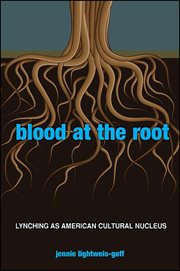Nonfiction
eBook
Details
PUBLISHED
Made available through hoopla
DESCRIPTION
1 online resource
ISBN/ISSN
LANGUAGE
NOTES
Examines the relationship of lynching to black and white citizenship in the 19th and 20th century U.S. through a focus on historical, visual, cultural, and literary texts. In Blood at the Root, winner of the SUNY Press 2009 Dissertation/First Book Prize in African American Studies, Jennie Lightweis-Goff examines the centrality of lynching to American culture, focusing particularly on the ways in which literature, popular culture, and art have constructed the illusion of secrecy and obsolescence to conceal the memory of violence. Including critical study of writers and artists like Ida B. Wells-Barnett, Richard Wright, William Faulkner, George Schuyler, and Kara Walker, Lightweis-Goff also incorporates her personal experience in the form of a year-long travelogue of visits to lynching sites. Her research and travel move outside the American South and rural locales to demonstrate the fiction of confining racism to certain areas of the country and the denial of collective responsibility for racial violence. Lightweis-Goff seeks to implicate societal attitude in the actions of the few and to reveal the legacy of violence that has been obscured by more valiant memories in the public sphere. In exploring the ways that spatial and literary texts replace lynching with proclamations of innocence and regret, Lightweis-Goff argues that racial violence is an incompletely erupted trauma of American life whose very hiddenness links the past to still-present practices of segregation and exclusion. Jennie Lightweis-Goff is a Visiting Instructor of English at the University of South Florida. She received a PhD in English and Graduate Certificates in Gender and Africana Studies from the University of Rochester
Mode of access: World Wide Web







